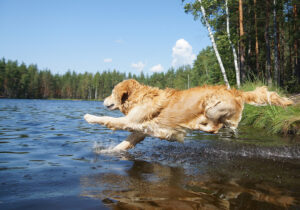
There are several summer water hazards that dog owners need to be aware of in order to prevent them from happening to their pup.
There’s something especially fun about bringing your dog out to the water during the summer months. It’s a joy to watch dogs swim and play while they get to cool off from the summer heat. It’s often fun for the owner, too! Unfortunately, there are some hazards associated with playing with your dog in and around water, especially during the summer. It’s important to keep a close eye on your pooch and take steps to minimize the risks of these potential problems.
Freshwater Intoxication
You may have heard of water intoxication before, as it is something that can happen to humans. Put simply, water intoxication is what happens when too much water is ingested. According to Cornell University’s College of Veterinary Science, freshwater intoxication causes electrolytes to become too diluted, causing the brain to swell. This can lead to seizures and other neurological conditions. If the intoxication is severe enough, it could even be fatal.
It is most common for freshwater intoxication to occur in dogs when they spend an extended period of time playing in a freshwater environment. Sometimes they stop to take drinks, but it is also very common for them to swallow a lot of water during the course of play simply through activity and using their mouth to grab objects and toys from the water.
To avoid freshwater intoxication, remember to limit any playtime in the water. Take regular breaks, at least every 30 minutes, in order to minimize the potential for your pup to swallow too much water and potentially become sick.
Saltwater Intoxication
Saltwater intoxication is basically just freshwater intoxication in reverse. The excess salt removes water from the brain, causing it to shrink. According to Cornell University’s College of Veterinary Science, symptoms include muscle tremors, disorientation, and seizures. Like freshwater intoxication, it does have the potential to be fatal if the condition is severe enough. Saltwater, especially ocean water, is also heavy in magnesium—this can cause explosive, watery diarrhea. This will typically pass on its own as long as your pooch doesn’t have saltwater intoxication, but it’s always a good idea to take them for a potty break before letting them get back into the car if you suspect they may have swallowed some seawater.
In order to avoid saltwater intoxication, it’s important to make sure your pup is well-hydrated before heading out to the beach for some playtime. Keep fresh water on hand in case they get thirsty to avoid a scenario where they feel compelled to drink ocean water. If they don’t seem to want to drink any fresh water, you can offer pieces of watermelon or ice cubes, as these are good alternatives to keep them hydrated if they’re refusing to drink from their water bowl.
Cyanobacteria
Cyanobacteria, also known as blue-green algae, likes to hang out in warm, stagnant water. During the summer, this can be a major hazard for any dog that drinks from standing water. The best possible way to avoid a run-in with cyanobacteria is to eliminate as many potential standing water hazards as possible from areas your pup frequents. Buckets, bird baths, and really any places water can accumulate are a problem.
According to Cornell University’s College of Veterinary Science, some cyanobacteria produce toxins that cause rapid, massive liver necrosis when ingested. Others produce neurotoxins that cause immediate, severe, and irreversible damage. In both of these cases, the dog often doesn’t have enough time to get to a veterinarian for medical intervention before it’s too late.
Always make sure your dog is well hydrated before you head outside to play to keep them from wanting to drink from suspicious sources, and if you’re out and about, you can allow them to drink from clear, cool, moving water.
Trust Maryland Veterinary Surgical Services With Your Companion’s Health
Your companion’s health is important, and the team at MVSS is ready to provide the best care possible for your furry family. We are dedicated to combining comprehensive exams and assessments with informative and honest discussions of your companion’s care. Once we have worked with you to decide on the best course of action for your dog, our professionals will use their surgical expertise to work towards the goal of giving your companion an active and pain-free life. We are proud to serve loyal companions in Catonsville and Baltimore. To learn more about our services, give us a call at 410-788-4088 or visit us online. For more information and tips for pet health, follow us on Facebook and Pinterest.
